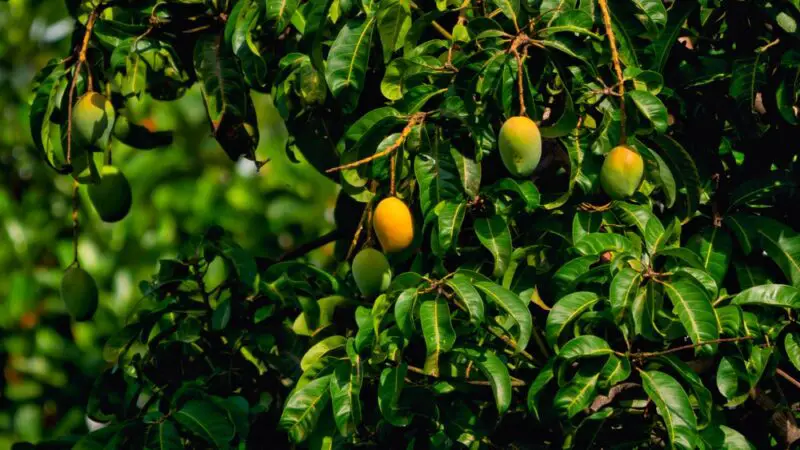Deciduous trees are trees that lose their leaves, typically in the fall. You can usually tell if a tree is deciduous by its leaves; however, with mango trees, it is not as straightforward. Mango trees are tropical and considered evergreens because they do not lose their leaves in the fall.
Nevertheless, they can be classified as deciduous because they lose an extensive amount of leaves due to various conditions, such as weather, seasons, tree diseases, and soil quality. Mango trees are susceptible to their surroundings and can be greatly affected by the climate, location, and care.
If the leaves on your mango trees are falling off, you may be wondering if the species is deciduous. This article will provide the answer to the question, ‘is mango a deciduous tree?’

So Is A Mango A Deciduous Tree?
The mango tree is a deciduous tree. The leaves of deciduous trees, such as mangoes, fall each season. The mango tree drops its leaves seasonally or periodically, while others, like the maple, are highly deciduous.
To reach maturity, mango trees grow slowly and take many years. Upon reaching full growth, a mango tree has a large symmetrical canopy covered with green leaves.
A pile of fallen leaves may accumulate under the tree as the leaves fall periodically during the year. Fruit that is left unpicked for too long will drop as well.
Mango is not considered to be citrus; rather it’s a tropical fruit.
Mango Trees: Why Do They Drop Their Leaves and How Can You Prevent It?
Mango trees are one of the most popular trees in the world. They are known for their sweet fruit and their beautiful leaves. However, mango trees can be a bit finicky, and they sometimes drop their leaves. If you’re wondering how to prevent mango trees from dropping their leaves, there are a few things you can do.
First, make sure that your mango tree is getting enough water. Mango trees need a lot of water, so if you live in a dry climate, you may need to water your tree more often than you think. You should also make sure that your tree is getting enough fertilizer. Mango trees need a lot of nutrients to stay healthy, so if you’re not fertilizing your tree regularly, it could be causing it to drop its leaves.
Second, make sure that your tree is getting enough sunlight. Mango trees need a lot of sunlight to stay healthy, so if you live in a shady area, you may need to move your tree to a sunnier spot. You should also make sure that your tree isn’t being overwatered. Overwatering can cause mango trees to drop their leaves, so if you think you’re watering your tree too much, cut back on the amount of water you’re giving it.
Third, make sure that your tree isn’t being attacked by pests. Mango trees are susceptible to a variety of pests, so if you see any pests on your tree, you should treat them immediately. You can either use a pesticide or remove the pests by hand.
Fourth, make sure that your tree is getting enough pruning. Mango trees need to be pruned regularly to stay healthy, so if you’re not pruning your tree regularly, it could be causing it to drop its leaves.
If you follow these tips, you should be able to prevent your mango tree from dropping its leaves.
Conclusion
It’s no secret that mangoes are one of the most delicious fruits out there and they’re also a deciduous tree. Likewise, mangoes lose their leaves due to natural factors such as weather, soil, and climate, along with other fruit trees such as apples, pears, and peaches.
However, unlike other trees, mangos are evergreen and don’t drop all their leaves in the fall. This is because they’re native to tropical and sub-tropical regions where the climate is more consistent year-round.
Even though they don’t lose all their leaves at once, mangos can still be described as deciduous since they often create a lot of leaf litter. So the next time you enjoy a delicious mango, remember that you’re also eating fruit from a deciduous tree!